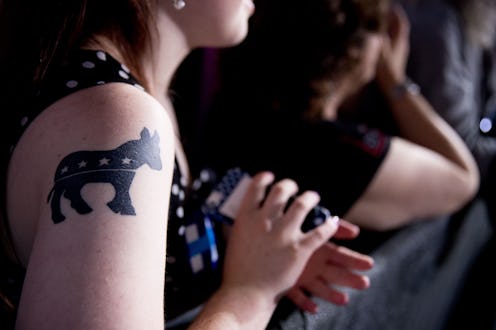News
Democrats Just Recognized Nonbinary Party Members In A Huge Way

Democrats have been shaking up the party's rules to make things fairer in recent days, and now they've moved one step further towards equality by adopting gender non-binary language in the Democratic Party charter. The Democratic National Committee (DNC) voted on the change to its rules Saturday to ensure that nonbinary and trans members are included in its gender balance guidelines. "At the root of our diverse party is a commitment to inclusion and opportunity," DNC Chair Tom Perez told CNN.
In the past, the party's rules ensured that men and women were equally represented on committees — "the variance between men and women may not be greater than one," the old rules said.
But that didn't leave a space for nonbinary members to participate, even as states begin to officially recognize nonbinary genders on documents including birth certificates and drivers' licenses.
Specifically the rules take nonbinary individuals, who don't are not either men or women, out of the traditional split the party used to use. Nonbinary members are removed from the total number and "the remainder of the delegation shall be equally divided," the new rules say.
The changes also modify the language to be more trans-inclusive so that members can self-identify as a man or a woman. The rules read that committees and other similar bodies "shall be as equally divided as practicable between men and women (determined by gender self-identification) meaning that the variance between men and women in the group cannot exceed one (1)."
Perez said these rules can be an example for other organizations, according to CNN:
By adopting this amendment, the Democratic National Committee is ensuring every Democrat feels welcome and embraced for who they are. This action reaffirms our solidarity with the LGBTQ community and challenges governments, employers, and organizations across the country to do the same.
DNC Secretary Jason Rae told CNN the changes make sure "all people were able to participate in the nominating process." The delegates each state sends to the Democratic National Convention in 2020 will also be subject to the rules. Democratic Parties at the state level, however, will still need to implement the plan in the lead-up to that year's convention.
"I know we have work to do to continue implementing this proposal," Rae told CNN. "I'm excited for the step forward we're making to show that we are a party that welcomes all of the LGBTQ+ community."
The party, which met in Chicago, also made headway on the contentious issue of superdelegates. Supporters of Bernie Sanders in the 2016 race blamed the party's nominating process for his loss, even though the primary winner Hillary Clinton won a majority of normal delegates, too. They argued it gave Clinton an advantage because voters assumed she'd win.
To avoid similar divisions in 2020, this week the DNC also voted to limit the role of superdelegates in the presidential nomination process. Only delegates elected by their state party, representing the outcome of the state primary or caucus will get a vote — unless the process becomes deadlocked. Then superdelegates could move in.
Perez said this week the change is key to "earn trust" and "return power to the grassroots." With the nonbinary language adopted Saturday, the grassroots will be more inclusive, too.